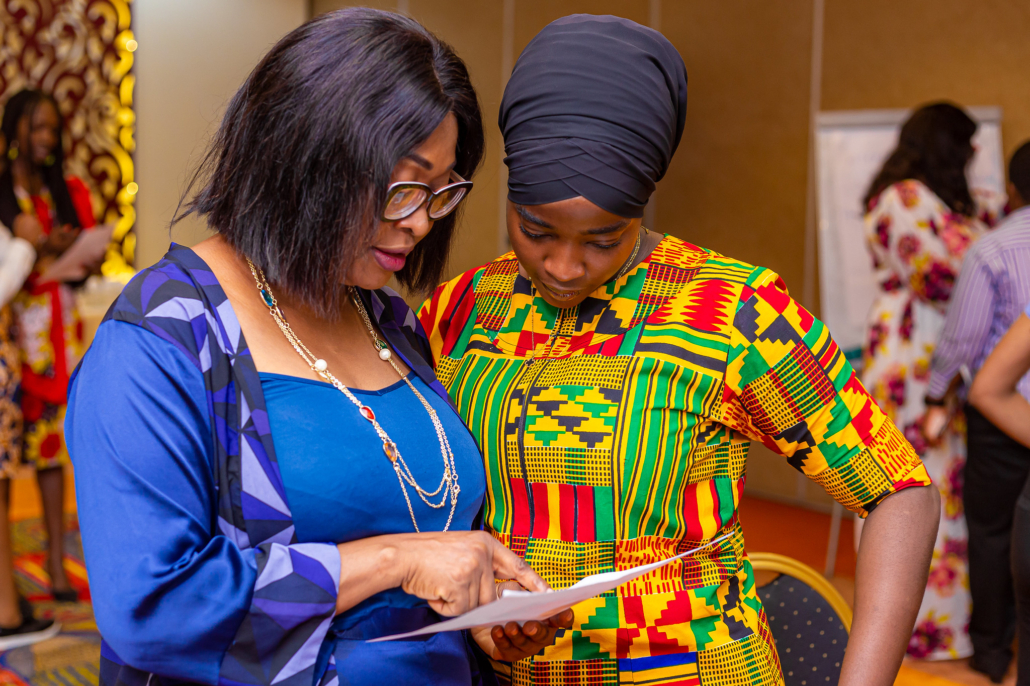Women in Nigeria Lead Entrepreneurial Charge
 The Nigeria Bureau of Statistics (NBS) has recently reported that women own 40% of the businesses in Nigeria, which is a large improvement from the World Bank’s report of only 34% of women owning businesses in 2018.
The Nigeria Bureau of Statistics (NBS) has recently reported that women own 40% of the businesses in Nigeria, which is a large improvement from the World Bank’s report of only 34% of women owning businesses in 2018.
Women in the Workforce
Women in Nigeria lead the entrepreneurial charge. More Nigerian women are now focused on making their own money in 2023. Also, according to UN Women, “unemployment has decreased by 7.5% for women in Nigeria.”
They demonstrate the uptick of women in the Nigerian workforce, which men have notably dominated. The increase in women working connects to Nigeria’s dire economic status and the recent gas and food price increases. Nigerian families are struggling to feed their children, forcing women into the labor force.
Women are shattering barriers and breaking into male-dominated jobs such as agriculture, vendors, or skilled manual workers to help their husbands stay afloat and families survive.
Nigerian Women Breaking the Glass
Today, more Nigerian women have become empowered to join and lead the workforce.
Fara Ashine-Jituboh is the founder and CEO of Okra, a tech company that helps create a faster way for African companies to access financial data.
“You’re now seeing women be leaders, cofounders, CEOs, CTOs, COOs and they’re building across multiple spaces… More teams are seeing female leaders as well,” says Ashine-Jituboh.
Despite the exceptional growth of female entrepreneurs, Nigerian women still face barriers when starting a business. Recent data by the African Development Bank reports a $42 billion gender financing gap, meaning women are less likely to receive higher business loans compared to men.
Nonetheless, Nigerian women persevere. Many Nigerian women have found great success with numerous tech start-ups, as it is a booming enterprise in Nigeria.
Maya Hogan-Famoda, a Nigerian-American venture capitalist investor in her interview with CNN, states:
“In 2016, it was only $129 million that came into all of African tech; in 2021… venture capital dollars into technology companies were over $5 billion.”
Nigerian Women are Leading the Entrepreneurial Charge
Over the years, tech start-ups have been an excellent route for many female entrepreneurs, but tech is not the only path that brings success to Nigerian women. Here are some female-owned businesses that have thrived in various avenues.
ReelFruits
A pioneering company in the snacks industry in Nigeria, Affiong Williams founded Reel Fruits in 2012 with the initial goal of simply employing Nigerians as Nigeria was dealing with an immense decline in employment.
ReelFruit has created more than 250 jobs in Nigeria and includes local farmers in manufacturing to put money into their economy.
However, Williams has gone beyond her original goal, as she has created the largest dried fruit processing company. They now sell their snacks in more than 10,000 retail stores in Nigeria and have begun to expand into foreign markets, exporting to the U.S. and Europe.
Volition Cap
Volition Cap is a growth equity firm that educates businesses and individuals on creating wealth in Africa. The two Nigerians behind Volition Cap are Subomi Plumptre and Kola Oyeneyin, who founded Volition Cap in 2018 to create a “safety net” for African working-class citizens.
Volition Cap offers online investment courses for small businesses to ensure more African companies are financially stable.
Subomi Plumptre explains in her interview with CNN how important it is to educate the African community on finances.
“If the businesses go under, then it affects the people who depend on the businesses for their livelihoods: the employees, the suppliers, and the contractors. It has such a multiplier effect. So when there’s a recession, as fund managers, we need to turn our attention to funding businesses, and that’s what we’re doing now.’’
Plumptre advocates for economic literacy as the helping hand Africa needs to develop thoroughly.
Some of Volition Cap’s most significant accomplishments comprise developing a $30 million private equity fund for local farmers and real estate agents in Africa. The firm collected $250,000 for its entertainment and media fund, which will help filmmakers and the domestic film industry.
House of Tara
Makeup has become a massive market for many Nigerian businesses, and one of the more notable pioneers of its popularity in Nigeria is the founder of House of Tara, Tara Fela-Durotoye.
Fela-Durotoye established House of Tara in 1998 to create makeup designs for Nigerian brides. In 2004, Fela-Durotoye built the first make-up studio and schools in Nigeria, where she would go on to teach 80% of Nigerian makeup artists.
Fela-Durotoye explains to CNN the goal behind the creation of her schools:
“The aim is to equip graduates with everything they need to launch their beauty store, and past graduates have gone on to start small firms that employ a handful of other makeup artists.”
Fela-Durotoye now has 14 schools, 19 studios in different areas of Nigeria, and 4,000 reps nationwide. Being one of the first female-owned businesses in Nigeria, Fela-Durotoye has been a crucial inspiration to many Nigerian women.
Conclusion
Women in Nigeria lead the entrepreneurial charge by withstanding the blockades thrown at them. Many Nigerian women, like Tara Fela-Durotoye, know these barriers and note that supporting fellow female entrepreneurs will allow for more significant progress in the community and the Nigerian economy.
– Jessica Jean-Baptiste
Photo: Flickr
